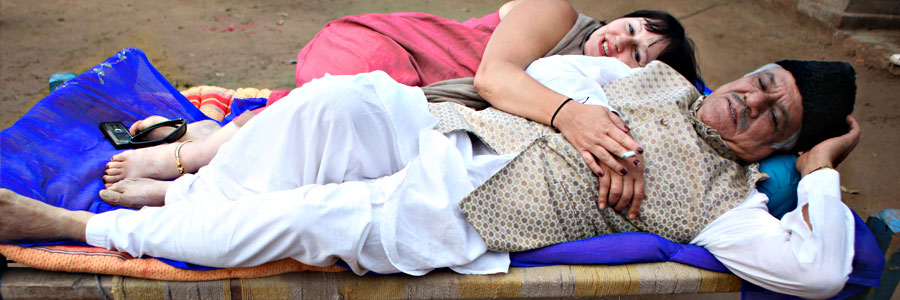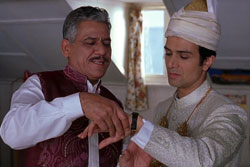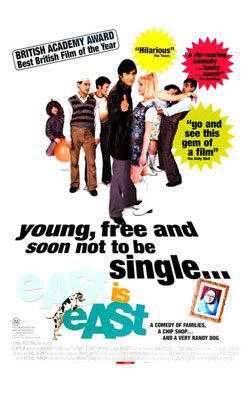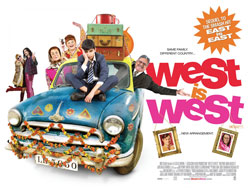
Leslee Udwin

WEST IS WEST (CINEMA)
Icon Film Distribution
Release date: February 25th 2011
Certificate (UK): 15
Running time: 102 minutes
Director: Andy De Emmony ¦ Writer: Ayub Khan-Din
Cast: Aqib Khan, Om Puri, Linda Bassett, Ila Arun, Emil Marwa, Jimi Mistry
Former actress and producer Leslee Udwin is a woman who knows her way around films; how to get them made; what drives them and why we go to see them. She’s also extremely passionate about them and more so when it comes to British films.
After having produced the phenomenally successful East Is East (1999), written by Ayub Khan Din, Leslee and her production company Assassin Films revisit the Khan family 11 years later with West Is West and a completely new story.
We met up for what would be a insightful and entertaining chat about the making of East Is East, West Is West and the British film industry.
PATRICK: How did you first get to know Ayub Khan Din?
LESLEE: I used to be an actor in my former life, before I became a producer 12 years ago. I spent a year in Spain acting in a television series with Ayub’s wife, Buki Armstrong, and that’s when I first met Ayub. He was also an actor. When we all got back to London, Ayub had a test reading for a yet undeveloped stage play called East Is East for Tamasha Theatre which is an Asian theatre company in Britain. They were considering putting this on at the Royal Court so he invited me to come along because he knew I had just started producing for television. He said “Would you come along to this reading and tell me if this has any life beyond the stage for film or TV”.

I fell head over heels in love with this piece. I recognised very forcibly George Khan as my father, despite the fact I have no actual direct links with either Pakistan or England, my father’s Jewish but he’s George Khan 100%. It was so universally recognisable as my family, my story. I became quite passionate about it. He further developed it, put it on at the Royal Court and it was so brilliantly developed from that reading.
I got on to the agent and there was a lot of interest in it. The fact that I was Ayub’s friend didn’t really work in my favour because I wasn’t high-powered as other people, and it would have been my first feature film but the agent recognised my passion for it, and he persuaded Ayub that I would be the right person because the others would be quite cynical and have lots of projects on their slate. I would have only one and I would push it through, and that’s how we did it.
We then worked for about two years to develop the stage play into a screen play and the rest is history.
PATRICK: The reaction to East Is East must have been overwhelming, did you expect it?

LESLEE: I know it’s easy to say in hindsight but hand on heart, I knew this would be a breakthrough film. The shock to me was not that it did well, but others didn’t believe me when I said it would. I had a huge battle to persuade financiers. I finally managed to get only one offer and I approached, I swear to you, hundreds of companies. They all said “This will not do well beyond some small Asian enclave in the UK!” I said “Are you crazy? This is a multiplex hit!” It’s recognisable, it’s universal, it’s everybody’s story, and it’s my story. It’s because I had felt that so forcibly that I knew it would be [a hit], given the chance.
Film 4 had a diversity brief at that time, it was the beginning of that buzz word “diversity” so they said they would fully fund it and that gave it its life.
PATRICK: Why did Damien O’Donnell decide not to return to direct West Is West?
LESLEE: Usually when a director directs a film, in his or her contract it’s always written that they will have the right to first refusal if there are any remakes, sequels or spin-offs. So of course, when we developed the script we showed it to Damien and the offer to him was to direct it.

He asked the question very fundamentally “What is a sequel?”, this is what it all rested on. Our interpretation of what he was saying was that it has to deliver on the same premises as the first. He wanted the motor of the new film to be the arranged marriage for Maneer because East Is East’s basic plot motor was an arranged marriage. We felt that would disappoint the audience, we certainly didn’t want a repeat. We wanted new territory, to make a film that was stand-alone for a generation that might not have seen East Is East. To us, a sequel shares some characteristics or characters of the first film, i.e. it is a continuation of the saga of that family but in completely new pastures.
So it was over a lack of agreement of what the film should be about that we parted company.
Interview Part 1 | Interview Part 2 | Interview Part 3

Patrick Samuel
The founder of Static Mass Emporium and one of its Editors in Chief is an emerging artist with a philosophy degree, working primarily with pastels and graphite pencils, but he also enjoys experimenting with water colours, acrylics, glass and oil paints.
Being on the autistic spectrum with Asperger’s Syndrome, he is stimulated by bold, contrasting colours, intricate details, multiple textures, and varying shades of light and dark. Patrick's work extends to sound and video, and when not drawing or painting, he can be found working on projects he shares online with his followers.
Patrick returned to drawing and painting after a prolonged break in December 2016 as part of his daily art therapy, and is now making the transition to being a full-time artist. As a spokesperson for autism awareness, he also gives talks and presentations on the benefits of creative therapy.
Static Mass is where he lives his passion for film and writing about it. A fan of film classics, documentaries and science fiction, Patrick prefers films with an impeccable way of storytelling that reflect on the human condition.
© 2022 STATIC MASS EMPORIUM . All Rights Reserved. Powered by METATEMPUS | creative.timeless.personal. | DISCLAIMER, TERMS & CONDITIONS
HOME | ABOUT | CONTACT | TWITTER | GOOGLE+ | FACEBOOK | TUMBLR | YOUTUBE | RSS FEED
CINEMA REVIEWS | BLU-RAY & DVD | THE EMPORIUM | DOCUMENTARIES | WORLD CINEMA | CULT MOVIES | INDIAN CINEMA | EARLY CINEMA
MOVIE CLASSICS | DECONSTRUCTING CINEMA | SOUNDTRACKS | INTERVIEWS | THE DIRECTOR’S CHAIR | JAPANESE CINEMA





